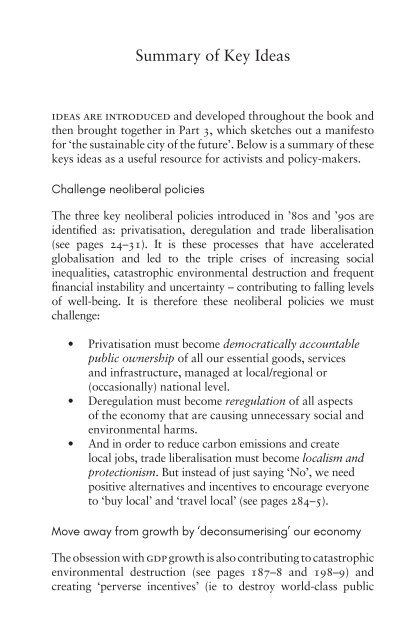You also want an ePaper? Increase the reach of your titles
YUMPU automatically turns print PDFs into web optimized ePapers that Google loves.
Summary of Key Ideas<br />
ideas are introduced and developed throughout the book and<br />
then brought together in Part 3, which sketches out a manifesto<br />
for ‘the sustainable city of the future’. Below is a summary of these<br />
keys ideas as a useful resource for activists and policy-makers.<br />
Challenge neoliberal policies<br />
<strong>The</strong> three key neoliberal policies introduced in ’80s and ’90s are<br />
identified as: privatisation, deregulation and trade liberalisation<br />
(see pages 24–31). It is these processes that have accelerated<br />
globalisation and led to the triple crises of increasing social<br />
inequalities, catastrophic environmental destruction and frequent<br />
financial instability and uncertainty – contributing to falling levels<br />
of well-being. It is therefore these neoliberal policies we must<br />
challenge:<br />
• Privatisation must become democratically accountable<br />
public ownership of all our essential goods, services<br />
and infrastructure, managed at local/regional or<br />
(occasionally) national level.<br />
• Deregulation must become reregulation of all aspects<br />
of the economy that are causing unnecessary social and<br />
environmental harms.<br />
• And in order to reduce carbon emissions and create<br />
local jobs, trade liberalisation must become localism and<br />
protectionism. But instead of just saying ‘No’, we need<br />
positive alternatives and incentives to encourage everyone<br />
to ‘buy local’ and ‘travel local’ (see pages 284–5).<br />
Move away from growth <strong>by</strong> ‘deconsumerising’ our economy<br />
<strong>The</strong> obsession with gdp growth is also contributing to catastrophic<br />
environmental destruction (see pages 187–8 and 198–9) and<br />
creating ‘perverse incentives’ (ie to destroy world-class public


















